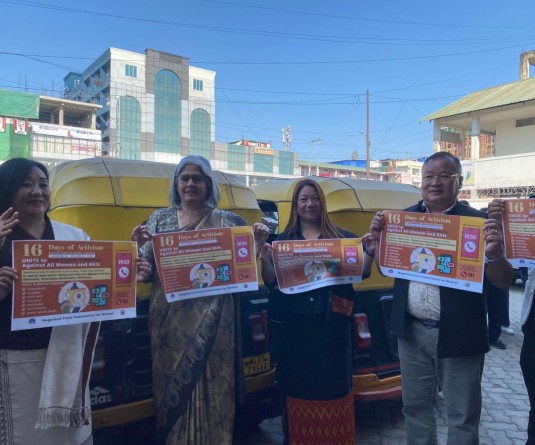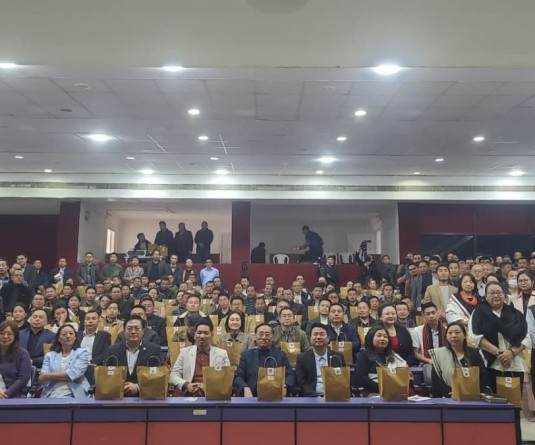
DIMAPUR, MAY 18 (MExN): Secretary General of the Naga Peoples’ Movement for Human Rights (NPMHR), Neingulo Krome addressed the 15th Session of the United Nations Permanent Forum on Indigenous Issues (UNPFIS) at the United Nations Headquarters at New York on May 17, 2016.
He presented a paper titled ‘Indigenous Peoples; Conflict, Peace and Resolution’ outlining the history of the Naga political issue, and urging for a peaceful and honourable solution.
Krome recalled that even the then Secretary General of the United Nations, Boutros Ghali had acknowledged that “there is human rights situation in Nagaland”.
19 years since the second ceasefire, Krome lamented that political negotiations have been going on without any concrete resolution. “We do not know when a resolution to our conflict will come,” he said.
He however acknowledged that there have been positive outcomes in the various stages of negotiations despite the many “frustrations.” He informed the UN gathering that on August 3, 2015, a Framework Agreement was signed between the Government of India and the NSCN (IM), and that the Indian Prime Minister had also announced to the international community in Dubai that a final peace settlement to the Nagas issue is at hand. This has however not happened yet, he stated.
Krome noted that India is “infested with all kinds of social and political unrest wherever Indigenous peoples live.” Many indigenous peoples even in North East India are also asserting their rights and have been fighting for their rights, he said.
He further said that terming the Naga political movement as the “mother of all insurgency in North East India,” as has been branded often, “is not necessarily correct because of the nature in which Governments deal with Indigenous peoples and their issues.”
While acknowledging that nobody wants to live in a trouble-torn state of affairs, he however said that nobody will also easily give up their rights without some kind of respect to their human dignity.
Therefore, Krome said that every people’s movement in India is “watching how India is going to resolve the Naga issue.” “If the resolution of the Naga conflict is seen as honourable and acceptable, there are huge possibilities where other Indigenous Peoples movement may come forward for peaceful resolution as some are already doing. But if it is not, in all likelihood the situations in the already trouble-torn Indigenous areas may deteriorate,” he cautioned.
Stating that the Nagas had fought and resisted the invading British colonials for 47 years; and was subject to colonialism for 68 years, Krome said: “we have undergone all kinds of human sufferings and humiliation for another 50 years under military occupation of India.”
Despite the ceasefire continuing for the last 19 years, Krome said that these 19 years of ceasefire and political negotiations have also seen “psychological warfare, developmental aggressions, corruption and divisions at all levels of the society, while the energy of the peace loving citizens are drained just in trying to keep the peace process alive.”
He added that the Naga people have also been subjected to several issues commonly faced by indigenous peoples in Asia. Indigenous peoples in Asia, he noted, have faced long-standing conflicts beginning with colonial powers and now with States under which their territories fall. To resolve these conflicts, Krome asked that the rights of indigenous peoples to self-determination be respected as per Articles 3 and 4 of the UNDRIP so that they can freely determine their political status and freely pursue their economic, social and cultural development.
Besides political conflicts, development aggression of States in indigenous territories is adding to the worsening situation of indigenous peoples. The NPMHR General Secretary stressed on the need to fully implement the indigenous peoples’ rights to lands, territories and resources as guaranteed mainly in Articles 26, 27, 28, 30 and 32 of the UNDRIP, including right against forced military activities in their lands. This would prevent and resolve further land-related conflicts of indigenous peoples, he added.
Krome then said that division of indigenous peoples through international borders has denied them the right to maintain and develop contacts, relations and cooperation, including activities for cultural, political, economic and social purposes, with their own members as well as other peoples across borders, as required under Article 36 of the UNDRIP.
He asserted that states need to take more effective measures to implement this right in conjunction with the indigenous peoples.






